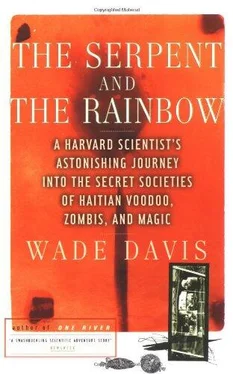Wade Davis - The Serpent and the Rainbow
Здесь есть возможность читать онлайн «Wade Davis - The Serpent and the Rainbow» весь текст электронной книги совершенно бесплатно (целиком полную версию без сокращений). В некоторых случаях можно слушать аудио, скачать через торрент в формате fb2 и присутствует краткое содержание. Год выпуска: 1985, Издательство: Simon & Schuster, Жанр: Старинная литература, на английском языке. Описание произведения, (предисловие) а так же отзывы посетителей доступны на портале библиотеки ЛибКат.
- Название:The Serpent and the Rainbow
- Автор:
- Издательство:Simon & Schuster
- Жанр:
- Год:1985
- ISBN:нет данных
- Рейтинг книги:5 / 5. Голосов: 1
-
Избранное:Добавить в избранное
- Отзывы:
-
Ваша оценка:
- 100
- 1
- 2
- 3
- 4
- 5
The Serpent and the Rainbow: краткое содержание, описание и аннотация
Предлагаем к чтению аннотацию, описание, краткое содержание или предисловие (зависит от того, что написал сам автор книги «The Serpent and the Rainbow»). Если вы не нашли необходимую информацию о книге — напишите в комментариях, мы постараемся отыскать её.
The Serpent and the Rainbow — читать онлайн бесплатно полную книгу (весь текст) целиком
Ниже представлен текст книги, разбитый по страницам. Система сохранения места последней прочитанной страницы, позволяет с удобством читать онлайн бесплатно книгу «The Serpent and the Rainbow», без необходимости каждый раз заново искать на чём Вы остановились. Поставьте закладку, и сможете в любой момент перейти на страницу, на которой закончили чтение.
Интервал:
Закладка:
Praise for The Serpent and the Rainbow
“Mr. Davis’s book should become a classic in the literature of scientific adventure. He reports his adventures brilliantly, conjuring up characters and settings vividly and creating sinister suspense with the skill of an accomplished novelist.”
—Atlantic Monthly
“This first-hand account reads like inspired fiction. You can’t help but sink back in your chair and gleefully drink in the incredible journey that unfolds.”
— Glamour
“Certain to enthrall both the lay and the scientifically minded reader. He tells his incredible tale in a straightforward, highly readable manner.”
— Saturday Review
“As engaging as any fictional spy thriller … a must read for anyone fascinated by real-life adventures.”
— U.P.I .
“The rich flavor in this strange book is like that in the early Carlos Castaneda.”
— People
“Eloquent and dramatic… [Davis’s] greatest success is in revealing the world of vodoun without sacrificing the sense of wonder and mystery it evokes.”
— Village Voice
“The book is a thriller: Davis captures the excitement of a scientist hot on the trail of an elusive compound; he explores an exotic and beautiful country with the eye of a poet; he insinuates himself into Haiti’s secret societies and returns to tell us about it. It’s a virtuoso performance.”
— Baltimore Evening Sun
“You might call this Indiana Jones Goes Spooking. And spooky it is.”
— Playboy
“A powerful living cosmic view that questions and challenges the basic premises of western society and thought. A provocative look beyond the ‘black magic’ cliche.”
— Kirkus Reviews
“It is a remarkable story. I was fascinated by it.”
— Michael Crichton, author of Jurassic Park
“It is an exciting blend of adventure, science, and mysticism.”
— George Schaller
“Beautifully written. Wade Davis puts the search back into research and science back where it belongs — in the realm of high adventure. An absorbing blend of Journey to Ixtlan and The Double Helix.”
— Lyall Watson
“An interesting report on zombies, voodoo, and the secret societies of Haiti by an adventurous explorer of the botanical, pharmacological, and psychological mysteries of exotic cultures.”
— Andrew Weil, M.D., author of Spontaneous Healing
“Fascinating.”
— Peter Mattiessen
To my parents, to Professor Richard Evans Schultes, who made it possible, and to John Lennon .
He knew the story of King Da, the incarnation of the Serpent, which is the eternal beginning, never ending, who took his pleasure mystically with a queen who was the Rainbow, patroness of the Waters and of all Bringing Forth .
—A. CARPENTIER The Kingdom of This World
Everything is poison, nothing is poison .
—PARACELSUS
A Note on Orthography
THE ORTHOGRAPHY of the name of the Haitian traditional religion has been the source of some academic debate. The word voodoo comes from the Fon language of Dahomey (now Benin) and Togo. It means simply “god” or “spirit.” Unfortunately, as a result of the sensational and inaccurate interpretations in the media, Hollywood in particular, the word voodoo has come to represent a fantasy of black magic and sorcery. Anthropologists have attempted both to highlight and to avoid this stereotype by using a number of terms including vodu, vodun, voudoun , and vodoun . I have followed their lead because I feel, as I hope this book will show, that the rich religion of the Haitian traditional society deserves to be recognized, and what we have come to know as “voodoo” bears little resemblance to it. I use the term vodoun because it seems to me to be phonetically the most accurate. However, it is important to note at the outset that the Haitian peasants themselves do not call their religion “vodoun.” Theirs is a closed system of belief, and in a world of few alternatives one either “serves the loa”—the spirits—or one does not. Vodoun, from their point of view, refers to a specific event, a dance ritual during which the spirits arrive to mount and possess the believer.
For the sake of clarity, I refer throughout the book to the “vodoun society.” This is a concept of convenience, and it also reflects the view of an outsider looking in, not that of a believer surrounded by his spirit realm.
Likewise, the spelling of zombi is a matter of some disagreement. Webster’s prefers zombie , the more familiar form, to zombi . My Oxford dictionary doesn’t even have the term, which reflects the American fascination with Haiti since the Occupation. The sources in the literature are mixed. Seabrook (1929) spelled it zombie , as did Deren (1953). Metraux (1972), Huxley (1966), and Leyburn (1941), on the other hand, use zombi . Metraux is perhaps the recognized authority on the religion, but to my mind Deren had more intimate contact with the people and is an important source as well—although this has little to do with the spelling of the term.
Of more interest is the derivation. The word probably comes from the Kongo word nzambi , which more or less means “spirit of a dead person.” This is yet another example of the African roots of the vodoun religion and society.
PART ONE
The Poison
1
The Jaguar
MY FIRST MEETING with the man who would send me on my quest for the Haitian zombi poison occurred on a damp miserable winter’s day in late February 1974. I was sitting with my roommate David in a café on a corner of Harvard Square. David was a mountain boy from the West, one generation removed from the family cattle ranch, and just about as rough-cut and restless as Harvard could tolerate. My home was on the rain coast of British Columbia. Both of us had come East to study anthropology, but after two years we had grown tired of just reading about Indians.
A map of the world covered most of one wall of the café, and as I huddled over a cup of coffee I noticed David staring at it intently. He glanced at me, then back at the map, then again at me, only this time with a grin that splayed his beard from ear to ear. Lifting his arm toward the map, he dropped his finger on a piece of land that cut into Hudson’s Bay well beyond the Arctic Circle. I looked over at him and felt my own arm rise until it landed me in the middle of the upper Amazon.
David left Cambridge later that week and within a month had moved into an Eskimo settlement on the shore of Rankin Inlet. It would be many months before I saw him again.
For myself, having decided to go to the Amazon, there was only one man to see. Professor Richard Evans Schultes was an almost mythic figure on the campus at that time, and like many other students both within and outside the Department of Anthropology I had a respect for him that bordered on veneration. The last of the great plant explorers in the Victorian tradition, he was for us a hero in a time of few heroes, a man who, having taken a single semester’s leave to collect medicinal plants in the northwest Amazon, had disappeared into the rain forest for twelve years.
Later that same afternoon, I slipped quietly onto the fourth floor of Harvard’s Botanical Museum. On first sight the Spartan furnishings were disappointing, the herbarium cases too ordered and neat, the secretaries matronly.
Читать дальшеИнтервал:
Закладка:
Похожие книги на «The Serpent and the Rainbow»
Представляем Вашему вниманию похожие книги на «The Serpent and the Rainbow» списком для выбора. Мы отобрали схожую по названию и смыслу литературу в надежде предоставить читателям больше вариантов отыскать новые, интересные, ещё непрочитанные произведения.
Обсуждение, отзывы о книге «The Serpent and the Rainbow» и просто собственные мнения читателей. Оставьте ваши комментарии, напишите, что Вы думаете о произведении, его смысле или главных героях. Укажите что конкретно понравилось, а что нет, и почему Вы так считаете.












